More Protests for Women in Yarl's Wood
Home Office, Marsham St, London. Wed 31 Oct 2012
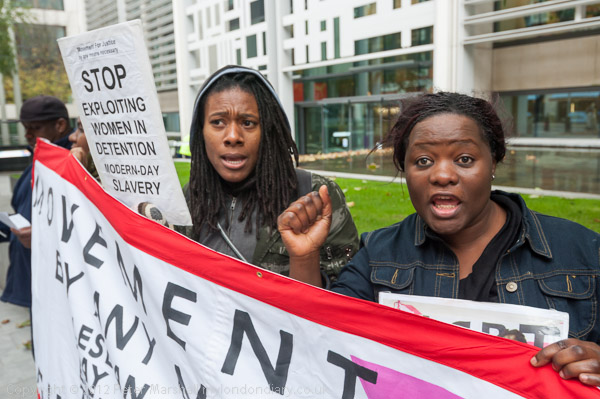
'Stop Exploiting Women in Detention - Modern-day Slavery'
more pictures
Protests continue at Croydon and Salford as well as another today at the Home Office to demand fair and just treatment for men and women detained in Yarl's Wood, for them to get fair hearings and to halt deportations to face persecution.
The protests are organised by the Movement for Justice, and by the time I had to leave as the protest was getting under way there were around 15 people chanting slogans, holding banners and placards and handing out leaflets, with more expected to arrive later.
The leaflet contains the demands which the women in Yarls Wood have formulated. They are trying to live with freedom, respect and dignity but face intimidation and harassment and are under constant threat of forcible deportation.
The demands start with the right to a fair hearing and for the facilities - including Internet access - to allow them to contact organisations that can help them and to hear about the current situation in their countries. They want an end to the 'Fast Track' procedures that are designed to deport people before they have the time to prepare their cases and so deny them justice.
They argue that people, many of whom are the victims of rape, abuse and torture, should not be "held against their will for simply seeking freedom and safety," and want an end to deportations, particular the mass deportations on charter flights and removals on scheduled flights.
Many women who claim asylum have been victims of human trafficking and violence and abuse within the family; some are fleeing from female genital mutilation or because they have opposed such practices. Others seek asylum because they face persecution - or even the death penalty because of their sexual orientation. Britain publicly opposes the persecution of lesbians, gay, transgender and intersex people, but the UKBA and the Fast Track system are complicit in sending people back "to the hands of our tormentors and oppressors."
Women held in detention centres are denied their freedom of speech, expression and organisation; their use of the Internet is denied or monitored and they are intimidated and threatened if they stand up for their rights or try to organise other women to express their views and demands. Their rights to privacy and respect are also abused, with male officers barging into female detainees' rooms and the UKBA (or its contractors) supervising their medical consultations.
Women are also exploited when they do cleaning or other work in the detention centres, being paid at the derisory rate of 50p an hour - they demand at least the minimum wage, and for the right to do paid work while their applications to the Home Office are outstanding. Detainees need money to buy credit for their phones or to buy items they need from the detention centre shops, including toiletries and food - and they want an end to the overcharging for goods in these. Detainees even have to pay for goods that are donated for free by charities and they complain they are charged £10 to access their medical records.
They also demand an amnesty now for all asylum seekers and immigrants currently in the UK, which would end cases such as that of Esther Sarah Nakuyejwe, a 43 year old diabetic whose health is deteriorating in detention and is under threat of deportation to Uganda. She came to the UK in 2001 as a student, but after she had been given misleading information by the Home Office, they took away her passport in 2005 and have not returned it. She worked in various NHS hospitals as a nursing assistant for 10 years and her entire family - a sister, four cousins and nieces and nephews - is now in the UK except for a terminally ill mother still in Uganda.
The protest was continuing when I had to leave.
more pictures
Arrest the Indonesian President
Downing St, London. Wed 31 Oct 2012
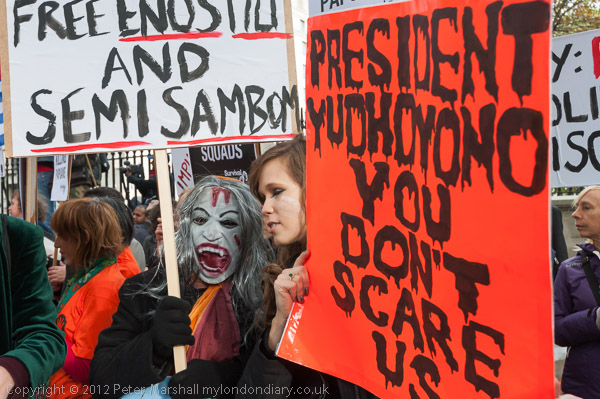
Protesters with mask and placards opposite Downing St
more pictures
As Indonesian President Yudhoyono began a state visit, protesters from human rights organisations & West Papua and Moluccan independence movements called for his arrest, an end to the killing of Papuans and release of political prisoners.
Indonesian President Susilo Bambang Yudhoyono is a former war lord in East Timor where he was involved in operations leading to the deaths of thousands of civilians, and is now in charge of an ongoing genocide in West Papua, where 500,000 people are thought to have been killed. In West Papua there is no freedom of speech and raising the flag of Free West Papua which several at today's protest were waving results in imprisonment for 15 years.
According to campaigners from West Papua:
"Every day women and children are being raped, villages burned, elderly murdered, and lives destroyed. People are being put in prison for raising a flag, or assassinated in broad daylight."
The protesters were from various groups including Amnesty International, Survival, the Indonesian human rights movement Tapol, green campaigners Rainforest Rescue (Regenwald) as well as supporters of the Free West Papua campaign and the Moluccan independence movement.
Protesters condemned the UK Government for inviting a war criminal to come to the UK and treating him to the ceremony of a state visit. The claims made by the Indonesian government to be As well as calling for the release of political prisoners and an end to the killing, some of those present were also asking for the arrest of President Yudhoyono for war crimes. After seeing a documentary film about the continuing genocide in West Papua, a prominent UK businessman offered a bounty of £50,000 for a peaceful attempt to carry out a citizen's arrest on the president during his visit.
Alex Regent, a spokesman for the movement to arrest him told the Indonesian newspaper Harian Detik "We believe he should face justice as thousands of people are being killed in West Papua. We hope that many UK supporters will attempt to arrest the president during his upcoming trip, to help bring into focus what Indonesia is doing in West Papua."
As the web site says: "Your attempts to arrest this war criminal will, at this stage, be largely symbolic, but they will have great political resonance." They suggest that someone should calmly "approach Susilo Bambang Yudhoyono and in a gentle fashion to lay a hand on his shoulder or elbow, in such a way that he cannot have any cause to complain of being hurt or trapped by you, and announce loudly, “Susilo Bambang Yudhoyono, this is a citizens’ arrest for genocide and crimes against humanity in West Papua. I am inviting you to accompany me to a police station to answer the charge."
This afternoon at Downing St, the President was nowhere to be seen, but perhaps later in his visit we may see someone going for the prize, though perhaps the main effect of the offer will be a little press interest and a higher than usual level of police protection for Susilo Bambang Yudhoyono.
Although one of the posters at the protest claim that Yudhoyonon is wanted by the International Criminal Court (ICC), Indonesia has not acceded to the Rome Statute, the founding treaty of the ICC, and it is not possible for the ICC to address his case. The Coalition for the International Criminal Court (CICC), whose Advisory Board is chaired by former Secretary-General of the United Nations and Nobel Laureate Kofi Annan and which includes many highly respected groups including Amnesty International and Human Rights Watch has called on Indonesia to deliver on its commitment to fight impunity for military crimes by ratifying the Rome Statute, but it has not done so.
Activists from the South Moluccan independence movement went to the courts to have the Indonesian president arrested for alleged human rights violations during an official visit to the Netherlands in 2010. Although the courts rejected the case as Dutch law guarantees him immunity as a sitting head of state, Indonesia cancelled the visit, but despite opposition here, our government is welcoming him with open arms.
I had expected to see West Papuan tribal leader and founder of the Free West
Papua organisation based in the UK Benny Wenda at the protest, but unfortunately
he is ill. Granted asylum in the UK in 2002 and living in Oxford, the Indonesian
government had applied through Interpol for his extradition on charges of
murder and arson, which he denies. Fortunately last August, Interpol came
to the decision that the case they were making against him "was predominantly
political in nature" and deleted him from their 'wanted' list.
more pictures
Zombie Crawl of the Dead
London. Sat 27 Oct 2012
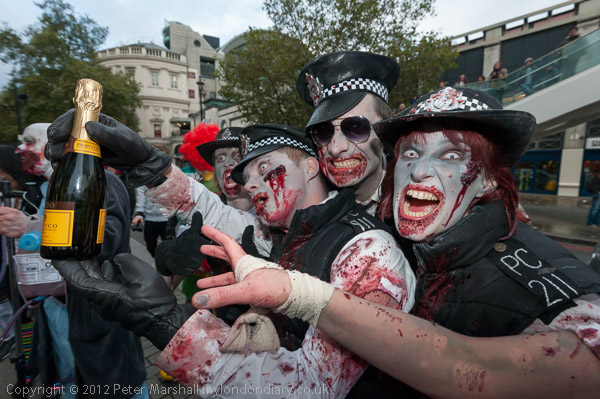 Zombie
police with their prize by the Jubilee Bridge
Zombie
police with their prize by the Jubilee Bridge
more pictures
Zombies gathered in the late afternoon on the Saturday before Halloween at
a pub near Waterloo for a crawl around London, simply a seasonal fun event.
There were alcoholic prizes for the best dressed, awarded and consumed after
the crowd of over a hundred had crawled their way across the Thames to Northumberland
Avenue, where I left them. The first prize went to a wandering patient, head
swathed in bandages and pushing a blood-filled drip, and his medical attendant,
though the group of police were also impressive.
more pictures
No More Police Killings, Time For Justice
Whitehall, London. Sat 27 Oct 2012
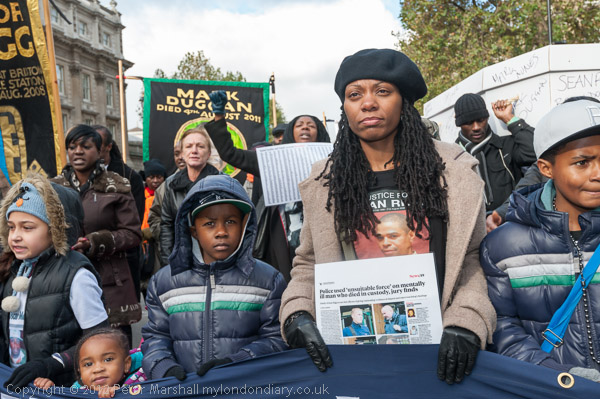
The march approaches Downing St, with Samantha Rigg
holding a report of the inquest on her brother.
more pictures
A slow silent march in memory of over 3000 people who have died in suspicious circumstances in custody since 1969 made its way slowly down Whitehall to Downing St, where a rally called for an end to police violence and immunity from prosecution.
The United Families & Friends Campaign (UFFC), a coalition of people whose family members and friends have died while in the care of police, prisons and in psychiatric detention held their fourteenth annual protest march in Whitehall today. Ovewr 500 people carrying banners representing the campaigns of many families made their way a a funeral pace with frequent stops from Trafalgar Square to Downing St.
Among the families involved in the campaign, many of whom were represented at the protest, were those of Roger Sylvester, Leon Patterson, Rocky Bennett, Alton Manning, Christopher Alder, Brian Douglas, Joy Gardner, Aseta Simms, Ricky Bishop, Paul Jemmott, Harry Stanley, Glenn Howard, Mikey Powell, Jason McPherson, Lloyd Butler, Azelle Rodney, Sean Rigg, Habib Ullah, Olaseni Lewis, David Emmanuel (aka Smiley Culture), Kingsley Burrell, Demetre Fraser, Mark Nunes and Mark Duggan. Every year the list of names of those who have died in custody grows by several hundred - and among the new names this year were Billy Spiller, killed on 5 Nov 2011 and Philmore Mills, killed in Slough on Dec 27, 2011 and Anthony Grainger, killed by police on 3 March 2012. A total of 3.180 whose names are known since 1969, and there are others about which no details are avaialble. Many have died in situations where foul play seems obvious, but not one single police or prison officer has been convicted.
There they came to a halt on the southbound roadway and held a rally at which many representatives of the families who are campaigning for justice spoke. Their stories were a horrific indictment of the UK police and justice system, with case after case of mainly fit and healthy men (and their have been some notable women) being detained by police and after a remarkably short time in the hands of the police being dead. Most but not all were black, but there was considerable agreement when one of the speakers said it was not a matter of race but of class; some police felt they could treat working-class people they detained how they liked, and that they could literally get away with murder.
Instead the police issue lies to the press - as in the case of Mark Duggan whose shooting which appears to have been an extra-judicial exection - sparked the recent riots, saying that the victims were pointing guns at police or false stories about drugs or gang connections or other stories which give lurid headlines. Often evidence later emerges which means they have to retract these stories - as in the case of the entirely innocent Brazilian electrician Jean Charles de Menezes.
These and other cases often too see police officers colluding with each other over stories - which again often unravel as more evidence emerges. We've seen too the deliberate use of discredited forensic investigators, as after the killing of Ian Tomlinson, as well as in that case and many others the deliberate use of delaying tactics in the investigation. CCTV evidence seems sometimes to mysteriously disappear, police fail to question officers who are the key suspects, and more. The Independent Police Complaints Commission has clearly too often has failed to be independent, often seeming to deliberately avoid or hide the the truth and to aid the police in getting away literally with murder.
High-profile deaths such as those of Tomlinson, Duggan, rapper Smiley Culture and immigration detainee Jimmy Mubenga, killed during his forced deportation, along with the failure to succesfully prosecute police officers have served to raise public awareness of the problem. The inquest on Sean Rigg, killed by police in Brixton in 2008 ended with some damning comdenation of the police in a narritive verdict, and his sisters Samantha Rigg-David was carrying a press account of it in the march. But despite this, justice has still not been served. In this and the other three thousand cases no police officer has yet been found guilty of murder or manslaughter.
The first to speak was Carole Duggan, who described the officer who shot her nephew Mark Duggan last year as "a serial killer in a uniform"; it was the lack of any response by the police to questions after Mark's killing which sparked last August's violence on the streets. She was followed by the mother of Anthony Grainger, a father of two shot in cold blood in Warrington when armed police stopped and surrounded a car carrying three unarmed men. Jan Butler spoke holding a photograph of her son Lloyd, telling us how police officers who should have been caring for him watched pornography and YouTube videos while he was dying in his cell.
Kadisha Brown-Burrell, the sister of Kingsley Burrell who died in hospital four days after police had sectioned him when he had made a 999 call when he and his five-year old son were being intimidated by a gang of youths told of the family's ordeal, being kept waiting for 18 months before the body was released to them so they could hold a funeral.
Stephanie Lightfoot-Bennet, twin sister of Leon Patterson, told us with tears streaming down her face of her long battle to get justice over the murder of her twin by Manchester police in 1992. After a second inquest (the first was abandonded after racist remarks made by the judge) gave a verdict of unlawful killing the police appealed and it was quashed. A third inquest came to the verdict "misadventure contributed to by neglect", amid a whole catalogue of misleading and changing evidence by police doctors, pathologists and others.
Demetre Fraser's mother told of the truly unbelievable story police had concocted that her son committed suicide by jumping from the 11th floor of a Birmingham tower block while being questioned by officers, which she describes as "a sick joke", contradicted by neighbours and the evidence. Next to speak was Samantha Paterson, sister of Jason McPherson who died after being detained by police and taken to Notting Hill Police station on 18 January 2007. An IPCC investigation exonerated the police but left many questions about his death unanswered.
Janet Alder talked about the death of her brother Christopher in Queens Gardens police station on 1 April 1998. An inquest jury who saw CCTV footage of his death reached a verdict of unlawful killing, and in 2002 five Humberside police officers went on trial accused of manslaughter and misconduct in public office, but the Judge ordered that they be cleared of all charges. After Janet Alder took the case to the European court under the European convention on human rights, the UK Government admitted a breach and apologised to the family. But earlier this year Christopher's body was found in a morgue. The body given to the family for the funeral in November 2000 was that of a Hull woman pensioner. Christopher was finally buried in Hull in February 2012, almost 14 years after his death.
I had to leave while she was still speaking, and before a number of other speakers from the families had their chance to talk. Among those who have played a leading part in the campaign for all the families involved to get justice are Samantha and Marcia Rigg, and earlier they had told me that at the end of the event they would deliver a letter to the Prime Minister in Downing St setting out the demands of the UFFC, which are listed on their e-petition page.
1. Replacement of the IPCC to ensure open robust transparent and thorough
investigations from the very outset of police deaths in custody – with
a removal of all ex-police officers for it to be a truly independent body.
2. The Prisons and Probation Ombudsman should be placed on a statutory footing.
3. Deaths in psychiatric detention and / or of those detained under the Mental
Health Act must be subject to a system of properly funded investigation that
is completely independent of the Health Service..
4. Officers and officials directly involved in custody deaths are suspended
until investigations are completed.
5. Immediate interviewing of officers and all officials concerned with the
death.
6. Officers and officials should never be allowed to collude over their evidence
and statements of fact.
7. Full and prompt disclosure of information to the families affected.
8. Prosecutions should automatically follow ‘unlawful killing’
verdicts at Inquests and officers responsible for those deaths should face
criminal charges, even if retired.
9. Implementation of police body cameras and cameras in all police vehicles
in the interests of both the officers and the public.
10. There should be an automatic right to non means tested legal aid for families.
There is a lack of funds for family legal representation at Inquests whilst
officers and NHS staff get full legal representation from the public purse
– this is unbalanced.
There was some support at the event from other groups on the British left, with BARAC and some trade union flags. One pole of the banner from 'Right to Protest' was held by Alfie Meadows; almost killed by police brutality during the student protest on 9 December 2010, police then charged him with violent disorder. After a jury failed to reach a verdict in his case in March, he is back in court this Monday for a retrial. Other human rights activists were also at the march, including Peter Tatchell.
As I was leaving the event, there were sounds of a disturbance, and I saw
that a small group, one of whom I recognised from EDL marches, had come to
shout abuse and were now being led away rapidly by police and chased by some
of those from the UFFC event, although stewards and others were trying hard
to get everyone to return to the rally. I photographed one man abusing a photographer,
forcing her to run rapidly backwards as he ran at her, and another with a
camera trying to hide his face behind his coat as he was being photographed
running away. The EDL, banned from marching in Walthamstow, had been allowed
by police to hold a static rally opposite Parliament around a quarter mile
away from the UFFC event, and it appears this small group had come down after
that, while the other fifty or so present went to a nearby pub, where there
was a loose cordon of police and a few photographers watching them.
more pictures
Don't Sentence Daniel Roque Hall to Death
Justice Ministry, Petty France, London. Thu 25 Oct 2012
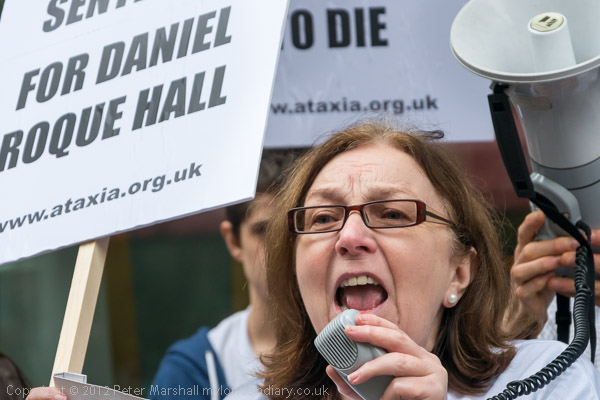
Anne Hall, mother of Daniel Roque Hall speaking outside
the Justice Ministry.
more pictures
Supporters of prisoner Daniel Roque Hall delivered a petition at the Justice Ministry to Jeremy Wright MP, Parliamentary Under Secretary of State for Prisons and Rehabilitation asking that he reconsider the conditions under which Hall is kept.
Daniel Roque Hall, aged 29 is stated in the preamble to the petition to be "in an advanced stage of Friedrich’s Ataxia, a degenerative, life-limiting disease. Wheelchair-bound, he has little voluntary movement. Speech impaired, he has difficulty swallowing, his heart is seriously damaged and he has Type One diabetes. Curvature of the spine puts pressure on his heart causing breathing difficulties and constant, severe pain."
There are around 10,000 sufferers from Ataxia in the UK of whom around 1200 have Friedrich’s Ataxia. Although incurable, proper care can greatly enhance and prolong life for sufferers. The charity Ataxia UK supports those affected by ataxia including their families, carers and friends as well as funding research into safe, effective treatments and to finding a cure for these genetic conditions.
When the judge at Isleworth Crown Court sentenced Daniel Roque Hall to three and a half years,for a drugs offence which he had immediately admitted and pleaded guilty, the prison governor to give an assurance that his health needs could be met before committing him. Although these were given by the governor of Wormwood Scrubs, within two hours of his arrival at the prison he had suffered a head injury that required hospital treatment; this was only given after repeated and insistent phone calls from his friends.
After the scan he needed in hosptial he was kept chained to a prison wareder in an old people's home for five days, without any food suitable for his diabetic condition before being taken back to the Scrubs. There he was denied access to his lawyer for 14 days. Back in prison he was denied much of the care he needs, in particular the exercise equipment which is essential to prevent further deterioration. He is currently in University College Hospital after his condition quickly worsened in prison.
Despite the assurances given to the judge by the governor, Wormwood Scrubs has proved itself woefully inadequate of providing proper care and if returned there it will be giving him a death sentence.
The petition delivered to a representative of the Minister of Justice by MP John McDonnell at today's protest urges "the Minister to ensure that Daniel serve the remainder of his prison sentence at a suitable place of confinement, properly adapted to his needs, or tagged at home."
Around 40 people came to todays event including Hall's mother, Anne Hall, Sue Millman, the chief executive of Ataxia UK and peace activist Bruce Kent, along with representatives of other groups including Liberty, Winvisible and Global Women's Strike.
Anne Hall gave a moving speech in which she mentioned some of the lies and half-truths from the prison authorities, which include false statements to the judge in court, as well as stating her conviction that any return to prison would be a death sentence. John McDonnell mentioned the early day motion he had tabled yesterday, with Sir Peter Bottomley, Conservative MP for Worthing West as sponsor, calling on the the Secretary of State to show the same compassion to Daniel Roque Hall as was shown to Gary McKinnon and to allow " him to serve the rest of his sentence at home, where he can receive the appropriate care and medical support and be supervised by probation services."
Sue Millman said that Daniel should be allowed to serve the rest of his sentence
in a way that does not further compromise his health; "Daniel was given
a three and a half year custodial term – not a death sentence."
more pictures
Kurds on Hunger Strike in London
St Martin in the Fields, London. Thur 15 Oct 2012
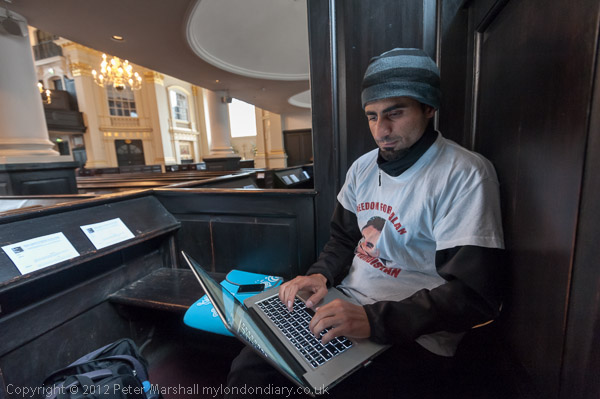
A hunger striker tweets about the hunger strike from inside St Martins in
the Fields
more pictures
A dozen Kurds are on a four day hunger strike in solidarity with Kurdish political internees in Turkey who have been on hunger strike for 44 days calling for the release of Ocalan and negotiations to resolve the question of Kurdish rights there.
The original 63 hunger strikers in Turkey have now been joined by around six hundred more, determined to fast until death and following a protest in London in support of them yesterday, Kurds in London have begun a four day hunger strike in solidarity at St Martin's in the Fields in Trafalgar Square. Some of the hunger strikers in London were sitting under blankets on the steps of St Martin's when I arrived, and a member of the clergy was talking with them. Others were sitting inside the church or one of the lobbies.
Today too, MP Jeremy Corby tabled an Early Day Motion (EDM 628) calling on the UK government to do all all in its power to support the rights of Kurdish people in Turkey. The EDM also asks that the House of Commons "condemns as reckless and merciless the bombing of Kurdish civilians by Turkish F-16 war planes on 28 December 2011 in the border province of Sirnak, which killed some 35 Kurds aged between 13 and 28 years old, provoking widespread protests among the Kurdish community and condemned by Kurdish politicians as a massacre". The bombing was authorised by the Turkish government led by Prime Minister Recep Tayyip Erdogan.
The Kurds have suffered oppression for almost 80 years since the Turkish government embarked on a programme of forcible assimilation, banning the use of the Kurdish language and attempting to eradicate their culture. Kurds, who live in Iraq, Iran and Syria as well as Turkey, have fought to retain their identity, and the conflict has often been a bloody one, with more than 40,000 killed and around 4,500 villages burnt down or evacuated. Millions of people have become refugees.
Turkish governments began talks with the Kurdish leader Abdullah Öcalan in 1993 and these continued after he was captured (with the help of Mossad or the CIA) in Kenya in 1999 and imprisoned in Turkey. Öcalan is still in jail, and has now been in isolation for 14 months. His position as Kurdish leader was confirmed in 2005-6 when 3.5 million Kurds signed a petition stating he was regarded as their political leader. The current government negotiated with him for two and a half years before breaking off talks in 2011. He had put forward a 'road map', a step by step plan for acheiving peace, including confidence building measures, international supervision of arms controls and leading to a solution of the 'Kurdish Question.'
The two central demands of the hunger strikers in Turkey were the release
of Abdullah Öcalan in order to negotiate a political settlement to the
Kurdish Question and for Kurdish language rights. The original 63 hunger strikers
are said by their families to be near to death, but the Turkish Justice Minister
who visited some of the hunger strikers yesterday and heard their demands
said that none of the 680 were in a critical condition. The government has
appealed for an end to the hunger strike but does not appear to be considering
acceding to any of the strikers demands.
more pictures
BHP Billington AGM Stop Dirty Energy
QE2 Conference Centre, Westminster, London. Thu 25 Oct 2012
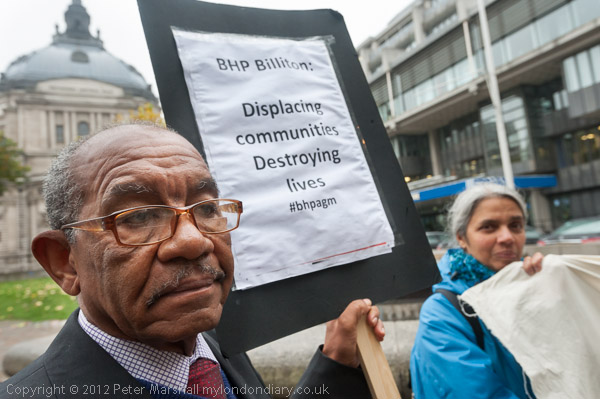
Felipe Ustate, a community leader from the north of Colombia was here to speak
to the AGM
more pictures
Protesters at the BHP Billiton AGM who stated the company makes massive profits but is destroying the earth through climate change and abusing human rights around the world included community leader Felipe Ustate from Cerrejon, Colombia.
BHP Billiton is the world's largest mining company, with massive interests in coal and iron ore. It's Cerrejon mine in Colombia is probably the largest opencast coal mine in the world, it owns one of the largest copper mines in Chile and another in Papua New, a huge aluminium plant in DR Congo, as well as coal and uranium mines in Australia. There's nickel in Colombia too, and copper and other minerals in Peru, and copper in the USA, and more.
Last year it produced over 222 million barrels of oil and over 100 million tonees of coal, and as one of the worlds largest coal suppliers it lobbies governments to protect its interests in burning fossil fuels and causing climate change. It also promotes other greenhouse gas and polluting fuels, and is involved in deep sea oil drilling and shale gas fracking. Its mining of uranium creates highly radiocative waste around the mine site, as well as producing toxic nuclear waste from power generation and enabling the proliferation of nuclear weapons.
BHP Billiton is two companies, the Australian BHP Billiton Limited, and London based BHP Billiton plc, run by the same board as a single enterprise. 86% of the money invested in the plc comes from UK investors, mainly banks, pension funds and insurance companies, so most of us in the UK have money in it indirectly even if we've not heard of it. It's much better known in Australia where it has extensive mining operations, including the Roxby Olympic Dam mine which produces copper, uranium, silver and gold.
Last year its profits were $US 27.2 billion. A small group of protesters outside the event handed out leaflets and others with shares in the company went into the meeting to voice their protest there. Among them was Felipe Ustate, a community leader from the north of Colombia who activists here collected money to bring over to ask the AGM to offer redress for the activities of the company at Cerrejon. The mine is one third owned by each of three major UK listed companies, BHP Billiton, Xstrata and Anglo American, and is accused of human rights violations over many years as communities have been displaced.
The London Mining Network who called today's protest state that the mine "has displaced farming and fishing communities, destroyed livelihoods, polluted the air and eradicated water courses." Many people can no longer grow crops and there have been forcible removals. According to BHP Billion Watch, "people are living in extremely difficult conditions, with blasting from the mine causing damage to homes, coal dust in the air causing skin and respiratory problems, land on which people used to work being swallowed up by mining activities or fenced off in readiness for mine expansion. People feel that their communities are being ‘strangled’."
The protesting shareholders were also raising the issue of the plans for a massive opencast coal mine in the middle of precious and fast-disappearing rainforest in Kalimantan in Indonesia. An Indonesian government agency has warned of the risk of massive financial losses and environmental damage.
Altogether around 20 people came with banners and placards on a damp morning
to hand out leaflets to shareholders attending the event and others on Victoria
St and Storey's gate in front of the QEII conference centre where the AGM
was being held. They included several anti-nuclear protesters from Kick Nuclear
and the protest was also supported by War on Want.
more pictures
End Indian Nuclear Projects
Indian High Commission, Aldwych, London. Wed 24 Oct 2012
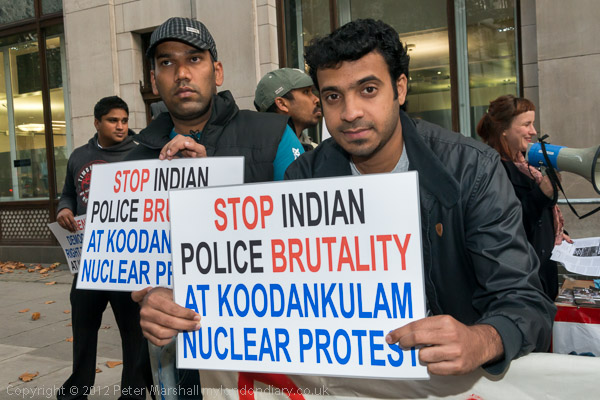
Police in India have brutally repressed protest against nuclear power
more pictures
Tamil Solidarity, CND and Kick Nuclear protested at the Indian High Commission calling for the Koondankulam nuclear project to be shut down, the Indian nuclear programme to be ended and a stop to the brutal police repression of protest in India.
The London protest was part of an international day of protest against the power plant in Tamil Nadu, India, along with other protests in Indai, Malaysia, Belgium, Germany and Austria. Also taking part in London were a group of Japanese who protest every Friday against the Japanese nuclear programe outside their embassy.
Last month, protesters agains the plant in Koodankulamwerem were met and stopped by 4000 police; they camped overnight and in the morning were baton charged and a leading activist was badly beaten. Shortly after police attaced the protesters again using tear gas , and a councillor was severely injured.
Media were kept away from the incident, and those already present were attacked, with a TV crew being thrown into the sea, a Times of India reporter having his head broken and another camera crew beaten up. In the evening ppolice raided a local village in a house to house search looking to arrest the leaders of the opposition and vandalising and brutalising women and children. Since then the violence has spread, and police killed a man when they fired into a group of protesting fishermen.
The protesters point out that there are abundant sources of renewable energy in India and call for massive public investment in this rather than nuclear. As well as avoiding the growing problems associated with nuclear power, with the unsolved problems of disposal of extremely long-lived highly dangerous radioactive waste and the disasters like those at Chernobyl, Three Mile Island and Fukushima and near-disasters in Sweden, the Netherlands, Japan and France, this would also make economic sense.
Although the industry argues its new generation nuclear reactors will be safer, the possibilities of failure through human error, accidents, earthquakes, floods and terrorist attacks can never be entirely eliminated. Renewable energy poses few risks and none of the dangers of radiation damage, and also provides far more jobs.
A full-scale renewable energy programme in India could provide millions of green jobs with less hazardous working conditions and decent pay. Nuclear provides relatively few jobs and these may involve grave health risks for those few who are employed.
Nuclear power is promoted by the big energy companies because it makes them large profits, much coming from subsidies from the government or from overseas government support the projects as a part of their aid programme.
Around 30 people came to the protest, and their were speeches in both English
and Tamil, chanting of slogans and handing out of leaflets. Banners, flags,
posters and placards also let the many leaving work and hurrying past know
why the protest was taking place.
more pictures
Against Workfare and Tax Cheats
Oxford St, London. Sat 20 Oct 2012
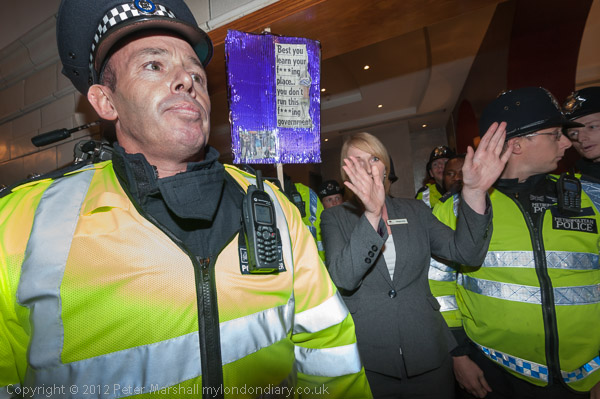 The
hotel manager asks the protesters to leave
The
hotel manager asks the protesters to leave
more pictures
Boycott Workfare protested on Oxford St against shops taking part in government work schemes which many unemployed are now force to undertake or lose benefits. Many shops closed down as the protest went past and there were scuffles with police.
Boycott Workfare describe themselves as "a UK-wide campaign to end forced unpaid work for people who receive welfare." They say that "Workfare profits the rich by providing free labour, whilst threatening the poor by taking away welfare rights if people refuse to work without a living wage."
The campaign is supported by a wide range of organisations including a number of trade union branches and today's protest on Oxford St attracted several hundred supporters, including a number dressed in black and masked with scarves or wearing 'Anonymous' masks.
It was advertised as a 'a fun and family-friendly action' and the presence of a samba band at the front of the action certainly made it more attractive, but although it started peacefully, later a number of scuffles broke out between protesters and police.
The protest was led off from Oxford Circus by a samba band and went down Regent St and into Great Marlborough St where protesters piled into a hotel - a former magistrates court - which makes use of workfare. Police followed the protesters inside and asked the manager to request that they leave. They attempted to do so, only to find that police outside were preventing them doing so. At one point I was being pushed by police from behind and in front, perhaps fortunately as I could have been injured when I was pushed down the steps which I was trying to go down.
Eventually the police outside got the message and we were all allowed to leave, going back to Oxford St. Here the protesters made an attempt to rush into a number of shops making use of workfare as well as some known to be avoiding payment of huge amounts of UK tax.
Many of the shops along the street lowered their shutters as the protesters approached, and police rushed up to protect the others. There were also police outside many likely targets such as Topshop.
At Oxford Circus they turned up Regent St, and around 20 of them managed to rush into a branch of Boot's before police blocked the entrance. After a short while the protesters left by a side entrance, and returned to Oxford St. One or two protesters managed to get into other shops, including Primark, but generally the police managed to keep them out, although of course they blocked the entrances as effectively as the protesters would have done.
They stopped briefly for a peaceful protest at the Salvation Army which makes use of workfare, with two protesters speaking briefly in the doorway before the protest moved on. They are one of a number of charities involved in the scheme.
At Marble Arch the protesters turned back towards Oxford Circus. A police line tried to stop them a few hundred yards down, but there were far too few police and they walked through past them as officers grabbed one or two protesters leaving gaps in the line. One or two police seemed to lose their tempers at this behaviour, and protesters were shouting at them to calm down. Before this I had seen quite a lot of sometimes very forceful shoving of protesters and a some pushing by them, but little real trouble. But in the confusion at this point apparently one officer was injured.
Shortly after police grabbed one of the protesters and dragged him to the side of the pavement front of a shop. While several police forcefully pushed him to the ground, others stood around them. They seemed to see their main purpose as preventing photographers and others from seeing what was happening, with one woman officer in particular following my every move to block my view, while I could hear the protester on the ground shouting that he was not resisting and asking why they kept on hurting him. From the brief glimpses I got as police attempted to prevent me seeing what was happening they appeared to be using entirely unnecessary force.
The protesters continued along Oxford St past Oxford Circus, but I decided
it was time to leave.
more pictures
A Future That Works TUC March
Westminster, London. Sat 20 Oct 2012
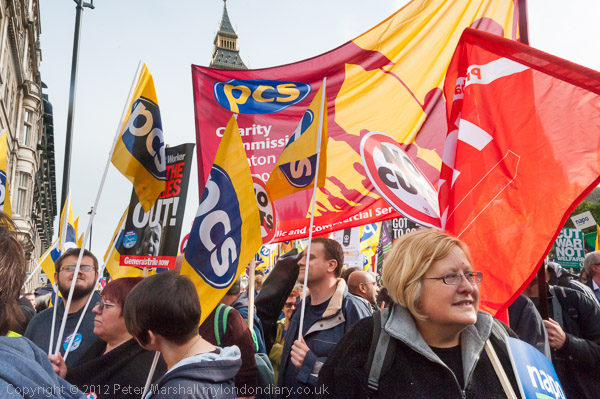
Marchers going past Parliament
more pictures
An impressively large march - said to be over 150,000 people - made its way slowly through central London to a rally at Hyde Park in the TUC organised march against austerity and for A Future That Works.
I photographed marchers going past Parliament and along Whitehall to Trafalgar Square and on to Piccadilly Circus on their way from Embankment to Hyde Park. I started at Parliament about half an hour after the front of the march had passed, and two hours later people were still passing me in a dense mass, waving flags and carrying banners.
Most of those I saw were with various trade union groups, some with fine banners, including some truly historic examples. But there were also others marching with the trade unionists, including various political groups with a bloc of several hundred anarchists dressed in black, who were accompanied on both sides by an escort of blue-capped police. Earlier I had seen one small group of anarchists four being chased by a police FIT team who called in other police to surround them while they attempted to photograph them.
Apart from this the police seemed to be standing back and letting the extremely
well-behaved march carry on with a relatively small number of TUC stewards
directing them, although there were small groups of police standing at some
key points. There was a row outside Downing St, where many protesters stopped
for a while to express themselves forcibly in the direction of No 10, though
I suspect David Cameron was elsewhere.
more pictures
Edequal Stands with Malala
Downing St, London. Sat 20 Oct 2012
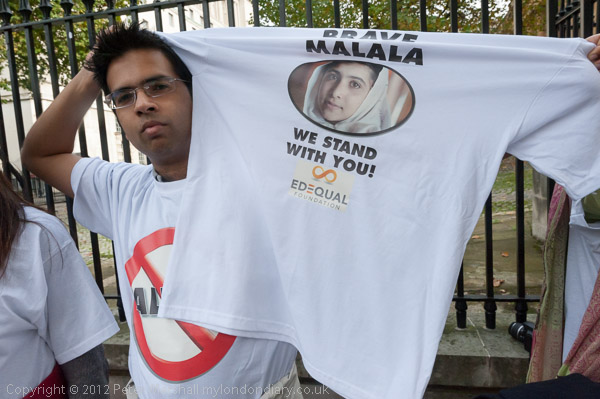
Brave Malala We Stand with You!
more pictures
Members of the Edequal Foundation, an educational charity founded by Shahzad Ali and based in north London which supports teachers and students demonstrated in a show of support for Malala Yousufzai, the Pakistani schoolgirl shot by the Taliban.
Malala who is recovering from her head wound in a Birmingham hospital was shot because of her campaigning for the education of women. She began in 2009 by writing a blog using a pseudonym for the BBC about life under Taliban control and was later filmed b the New York Times. Furher interviews in print and on TV have led to her nomination by Archbishop Desmond Tutufor the the International Children's Peace Prize and she has won Pakistan's first National Youth Peace Prize.
Her shooting has outraged public opinion across the world, including in Pakistan, but the Taliban has repeated that it intends to kill both her and her father.
A dozen or so from the Edequal Foundation came to stand opposite Downing
St this afternoon in solidarity with her holding up placards calling for 'Education
for All' and for everyone to stand up against ignorance and hate.
more pictures
Against Austerity For Climate Justice!
St Paul's Cathedral, London. Sat 20 Oct 2012
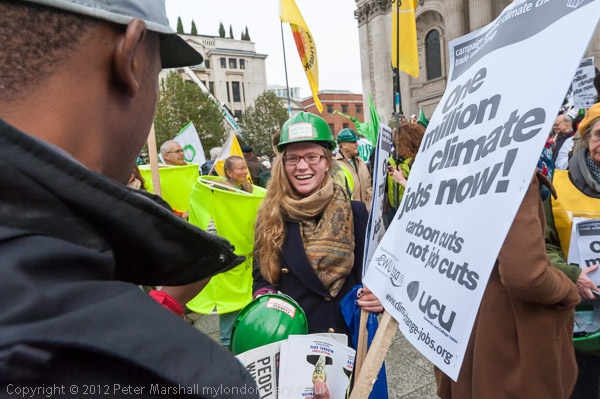
'One million climate jobs now!
more pictures
The climate bloc made the point that tackling climate change and reducing greenhouse emissions is a vital part of 'A Future That Works' in a rally on the steps of St Pauls before marching to join the main TUC march.
Joining them were a number of people from Occupy London and UK Uncut who made up a 'No cuts, no tax-dodging' bloc. Both groups were also handing out information about their major protests in London in December, the National Climate Change March organised by the Campaign Against Climate Change on 1 Dec, and a National Day of Action with UK Uncut and women's groups on 8 Dec.
The hundreds of people who came to St Paul's heard a number of hard-hitting speeches about the need for urgent action to prevent climate disaster, and for political action on the streets to persuade politicians to take the issues seriously rather than simply mouth platitudes while letting their policies be determined by the energy industry, aviation industry and others including climate sceptics. There was also entertainment with some fine performance poetry by Danny Chivers and a singer.
Many of those attending had banners and posters and there were a couple of model wind turbines, along with various flags and placards. A strong contingent from Anonymous UK came with their masks and they plan a major demonstration outside Parliament on Guy Fawkes day.
I left them as they marched off down Ludgate Hill and up Fleet Street on
their way to join with the TUC main march, though I was to meet some of them
later in the day in a Workfare protest.
more pictures
Fight for Sites go to Evict Pickles
Victoria, London. Fri 19 Oct 2012
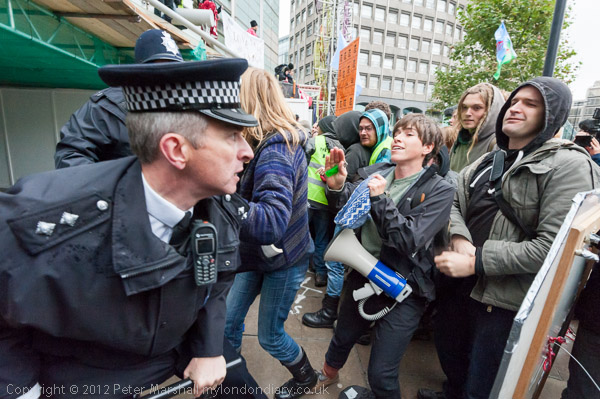
Police keep protesters away from the Ministry building,
but some are already on a low roof
more pictures
On the first anniversary of the brutal eviction of the Dale Farm Traveller community, activists marched to the office of minister Eric Pickles and served an eviction notice. Some scuffled with police as others climbed to show banners from a low roof.
The Fight for Sites (#F4S) protest was carried out by the Traveller Solidarity Network in protest over the evictions last year and the continuing harassment of travellers there and across the country.
The evictions last year at Dale Farm were from what was in most respects a highly appropriate, tidy and well-kept site, but the now empty 'green belt' land is an eyesore, filled with stagnant water, sewage and toxic material, while 83 homeless families, mainly evicted from the site, are now living on the approach road to the site without electricity or running water.
They now face a further round of evictions, but are only there because quite simply they have nowhere else to go. There is a chronic lack of sites for Gypsy, Traveller and Romany communities in the UK. The response of the Department for Communities and Local Government (DCLG) run by Minister Eric Pickles has been to worsen the situation by removing the duty of local government to permit sites and strengthening the power to evict. Travellers accuse him of of criminalising the travelling way of life and trying to force them into settled homes.
Around a hundred protesters gathered on the main concourse of Victoria Station this lunchtime, with a few Romani flags, some well-painted banners and some large cardboard 'caravan' sides. Some wore high-viz jackets designating them as 'The People's Bailiffs'. A few police stood around and watched, getting a little edgy and enquiring what the protesters intended to do, but only intervened when they asked for the bike-hauled sound system to be turned off so that people could hear the train announcements. Among those present was veteran Gypsy campaigner Grattan Puxon, Dale Farm spokesperson and founder of the Gypsy Council.
Finally the message came through that some of the Dale Farm women had arrived and the protest would be moving off shortly to the DCLG. It was spotting slightly as it set off on the short walk, and by the time we arrived the rain was a little harder. As the protesters massed in front of the building, some began to use a short ladde to begin climbing up onto a low roof at the front of the building. Police rushed in to stop them and a mêlée developed.
This gave the opportunity for another group of protesters to climb up undisturbed at the other end of the roof, and by the time police had noticed there were perhaps a dozen on the roof with flags and banners. The protesters had also pasted up eviction notices along the front of the building.
EVICTION NOTICE
For the attention of Mr. Eric Pickles
You are required to vacate the Department for
Communities and Local Government immediately.You have been provided with the legally required 28 day notice.
You have failed to comply. If you remain on the premises we
are obliged, under the terms of the notice, to evict you
forthwithWe remind you that you have been found in breach of your
contractual duties towards Traveller and Romani Gypsy
communities, With reference to section 178 of the Town and
Country Planning Act you have been found to have no plan, to
have engaged in persistent racially aggravated persecution,
and as such to have caused harassment, alarm, and distress
amounting to anti-social behaviour and gross misconduct.We wish to remind you that we have conducted an equality
impact assessment and balanced the needs of your political
career against the rights of Travelling communities to a home.In view of your failure to comply with this notice an eviction
operation will commence today. During this time we would
advise all other users that building access will be restricted.
Police continued to try and push the protesters back away from the building for some minutes, eventually putting their own cordon across its front and sealing it off as the protesters had tried to do. During this time they grabbed a number of protesters out from the crowd and appeared to be arresting them, some with perhaps unnecessary force. One man was grabbed and rushed away towards the waiting police vans just for singing the well known song 'ACAB' questioning the parentage of police.
A lengthy statement about the issues over Dale Farm and the evictions and the campaign being waged by Eric Pickles against Travellers which is aimed at destroying their way of life.
After this I had to leave to go elsewhere, with the protest still continuing
in now driving rain.
more pictures
Elephant Views
Elephant & Castle, London. Thu 18 Oct 2012
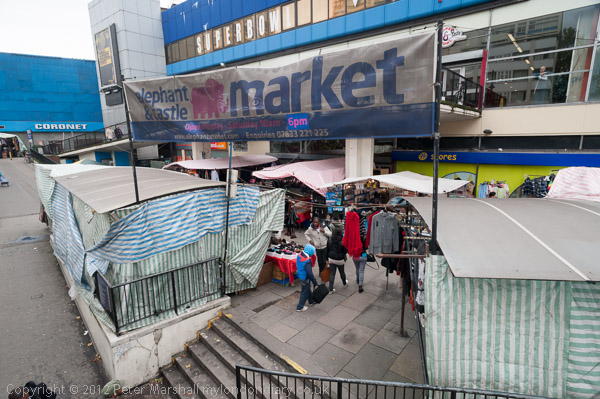 This
used to be a pink elephant but is now blue
This
used to be a pink elephant but is now blue
more pictures
I had to change buses at the Elephant on my way to pick up my lens from the repairers and took a few pictures while I was waiting. It's changed a little since I last photographed it, but not a great deal. I'd only really just started when my bus came and I had to run for it.
Green IS Working
Westminster, London. Thu 18 Oct 2012
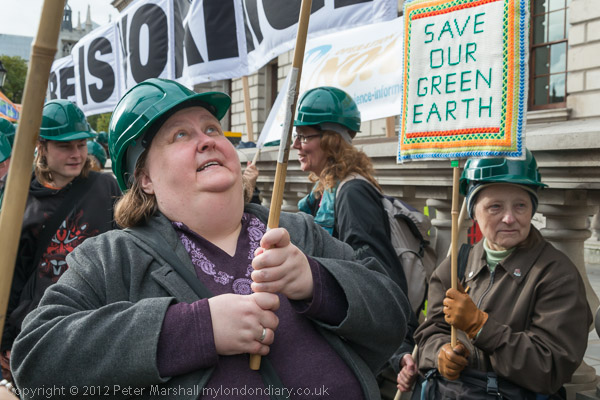
Protesters in green hard hats on Parliament St - with
an embroidered banner 'Save Our Green Earth'
more pictures
250 representatives of environmental and development charities along with trade associations and renewable energy enterprises held a protest at the Treasury wearing green hard hats to press the government to commit to make electricity green by 2030.
Among those taking part was Deborah Meaden of TV's 'Dragon's Den' who said "Greening our economy is a financial investment in our future – low-carbon is where business is going and it’s where the jobs will be. But companies are only going to invest in clean British energy if they’re sure the Government won’t pull the rug out from under their feet – that’s why there needs to be a target in the Energy Bill to clean up our electricity by 2030." Earlier this year the CBI reported that despite the recession the low carbon sector of the economy is booming with green business accounting for around a third of UK economic growth in 2011/2.
The call to the government to stand by its earlier committments came ahead of the Energy Bill which is being debated next month, with the protesters urging the Prime Minister and Chancellor George Osborne to set clear targets including eliminate carbon-based fuels - oil, coal, gas - from our electricity generation by 2030, to meet our committments to tackle climate change.
They also called on the Prime Minister to show his commitment to tackling climate change by including emissions from shipping and aviation emissions in the Climate Change Act in 2012. Their ommission is completely unsupportable, as the government's own official advisor, the Committee on Climate Change (CCC) has made clear - and the call to remove carbon from electricity generation is also in line with the CCC reccomendations.
The hard-hatted mass of protesters posed briefly for photographs on the ramp leading to the doorway of the Treasure, in a long line supposed to emulate the iconic 'Labour Isn't Working' Tory election poster. But the large banner stated a different message; 'Green Is Working'.
Across the road a half a dozen protesters held a rather smaller banner based on the same Tory poster, but showing a snaking line not of people but of wind turbines, with the message 'Green Isn't Working - Stop Fuel Poverty.' They came from an organisation calling for the repeal for the Climate Change Act on the grounds that it is too expensive and profits only a select group of green companies. Their web site also denies that the man-made contribution to any climate change is significant. They also call for an end to the Emissions Trading Scheme which they say is pointless and expensive and want an end to carbon taxes and green energy subsidies.
After the photographs the protesters moved around into Parliament St where
they stood in protest for another half hour or so in front of the other end
of the Treasury building beside the main road. As I left a small group of
the protesters were just about to go into Downing St to deliver a a joint
letter – signed by 55 signatories and copied to Chancellor George Osborne
– calling on the Prime Minister to stand by the Climate Act he supported
in opposition and step in to ensure his government doesn't lock the UK into
decades of polluting fossil fuels.
more pictures
Muslims Call for End to Vilification of Islam
Buckingham Palace Rd, London. Sun 14 Oct 2012
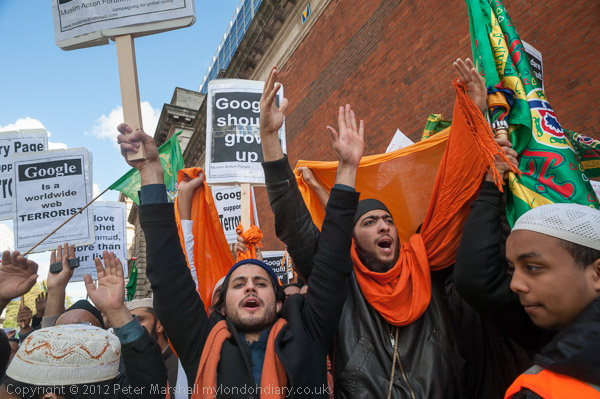
Muslims show their anger over the film
more pictures
A protest outside the London offices of Google, owners of YouTube, called on them to remove the anti-Islamic video and othr Islamophobic material. They want the UK Government and other organisations to endorse a Declaration of Global Civility.
The protest 'Stand Up Now - Show your love for the Prophet (saw)' was called by the Muslim Action Forum who describe themselves as a united platform of major Muslim organisations. On their web site they have a petition which introduces and endorses the 'Declaration of Global Civility' which calls for "mutual consideration and the revival of civility as a shared medium of dialogue" on the grounds that it will make us "better equipped to reconstructing a more enlightened society."
As well as asking both houses of the British Parliament to debate the endorsment of this declaration it makes a call to "all civilised people and institutions globally to disassociate themselves from any actions that are an affront to global civility" and in particular denounces "all those people who are connected with the production of the film ‘Innocence of Muslims’ and the publishers of the cartoons of the Holy Prophet Muhammad."
The Declaration begins with a statment about the increasing globalisation and greater exchanges between civilisations and ideas leading to a need for greater sensitivity and responsibility in their social conduct. It then states two maxims which should be at the centre of this:
"Maxim: “Do unto others as you would have them do unto you”
We recognise that individual or collective human dignity is a fundamental right and that the desecration of such through insult, denigration or humiliation is morally and ethically wrong.
Passionate emotions must be harnessed and channelled through good manners and etiquettes to civilise any debate in our diverse society.
Maxim: “Love for your brother what you love for yourself”
Reckless and malicious expressions will lead to vilification and demonisation of each other and our communities.
Our interdependency is the rule and not the exception. It is essential for us to have a sincere insight of each other which should lead to sustainable civility resulting in harmonious existence."
What many might feel is missing from the declaration is the lack of any reference or acknowledgement to the Universal Declaration of Human Rights which was adopted by the General Assembly of the United Nations in 1948 and is the foundation of our ideas of what a civilised society should be.
The Muslim Action Forum was founded following a meeting of "over 100 leading Muslim Scholars, Spiritual leaders and representatives of major Muslim organisations" in Birmingham last month, and one of the tasks given to it was to organise a "mass rally gathering over 100,000 Muslims in London (date to be announced) to endorse the global strategy dealing with this vilification and endorsing the Campaign for Global Civility."
Today's protest outside Google's HQ was not the first in London, with large protests held outside the US Embassy in September and Parliament last weekend. Although large enough to be impressive, this was not the mass rally that had been hoped for, with several thousand men packed fairly tightly into a hundred yards or so of street, and, a hundred yards or so behind them, a few hundred women in an entirely separate group.
The police had hoped the protest would be confined to one carriageway of the busy Buckingham Palace Rd, and had set up an extensive pen with barriers and empty space between it and the Google offices. This pen was getting fairly full when a large group of men arrived and decided to take over the other side of the road. Stewards and police held them back as they tried to move towards the platform, but after much negatiation they were allowed to move up so they could easily see the speakers and the giant screen above them on which they were projected.
The women were less fortunate, although there was good amplification so they
could hear the speakers, without binoculars even the giant screen was rather
samll from their position. There were no women inside the speakers enclosure
when I was there and none spake in the hour and a half I was at the protest.
Some of the speeches were in English, and those I heard were measured and
calm, calling for a boycott of Google and YouTube. One speaker suggested that
had the views in the film been expressed in public in the UK our laws could
have dealt with it; I'm not sure this is so, but certainly material available
in this country on YouTube should meet similar criteria. Although I couldn't
follow those who spoke in other langauges, some seemed to be getting very
passionate about the film and drew some powerful responses from the crowd.
I left thinking that perhaps global civility should include rather more tolerance
for the expression of views which are abhorrent to you, and should certainly
preclude the kind of violent responses that this film has aroused in some
Muslim countries. Even peaceful protests like these simply publicize what
is surely the production of a deranged mind, and they have lifted it from
its richly deserved obscurity; without them it would surely have sunk without
trace among the huge mound of seldom stirred detritus on YouTube. There are
outrages about which Muslims should surely be protesting - such as the shooting
by the Taliban of Malala Yousafzai for going to school and writing about it
for the BBC. It is good to see that there are signs of protest against this
in Pakistan, as well as protests being arranged in the UK. It would certainly
be a landmark in global civility if Muslims in the UK were to protest against
this in similar numbers, especially so if Muslim women were allowed to take
a leading role in these instead of being relegated to a back seat.
more pictures
Occupy Global Noise Street Party
St Paul's & to Tower Bridge, London. Sat 13 Oct 2012
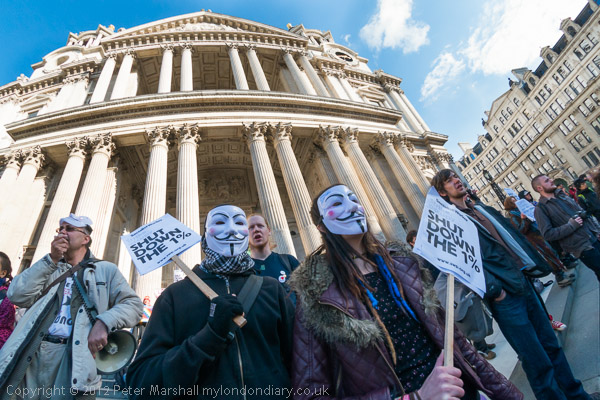
'Anonymous' masked protesters with 'Shut Down the 1%'
placards on the steps of St Paul's Cathedral
more pictures
On the first anniversary of their attempt to occupy the Stock Exchange, Occupy London joined a worldwide day of protest, #GlobalNoise, by the Occupy movement. In London it was the start of a week of activities leading up to Saturday's TUC march.
The organisers of #GlobalNoise state its aim as
"the targeting of political and financial elites who are held responsible for destroying our communities and the planet, resonating the ongoing wave of anti-austerity protests in Europe and around the world. At the same time #GlobalNoise is a symbol of hope and unity, building on a wide variety of struggles for global justice and solidarity, assuring that together we will create another world."
Cacerolazo, casserole or potbanging, with people determined that their views be heard making themselves known by banging on saucepans and other domestic utensil, started in Chile in 1971 and quickly spread through Latin America as a form of popular protest, then around the world. Protests today are taking place in around 40 countries around the world, with around 40 events in Spain alone, and in the UK in Leeds, Manchester, Edinburgh and Exeter as well as London.
After meditation, there were some speeches and entertainment before the group marched off through the city. There were a few brief sit-downs on the road before they went across London Bridge heading for an undisclosed location which they intended to occupy for the weekend.
When we reached the 'Scoop' next to City Hall, there was some disagreement as to whether this was a suitable place to occupy. Some of the protesters decided to go further on, and then saw Tower Bridge and went on to it. They blocked the roadway for a few minutes, sitting down where the bascules meet at its centre, but soon decided there were nothing like the numbers needed to stay for any length of time. As police approached they got up and went back to join the others at the Scoop.
Had they stayed they would have prevented the opening of the bridge a few
minutes later to allow the steamer Waverley to cruise through.
more pictures
Zombies Invade London
Bankside, London. Sat 13 Oct 2012
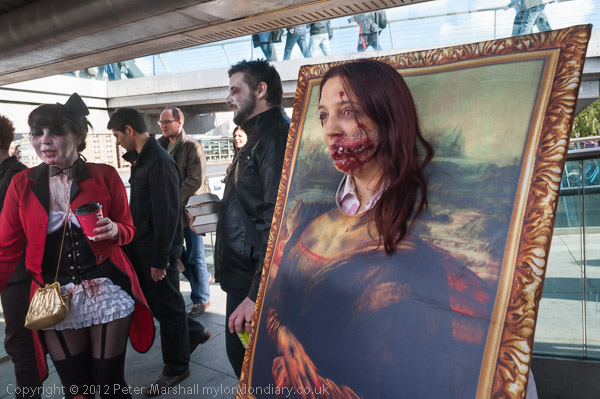
A zombie version of the Mona Lise erupts from her portrait
more pictures
Zombies met at lunchtime outside Tate Modern for a World Zombie Day annual fundraising flash mob/pub-crawl to "raise the dead and some dough in aid of St. Mungo’s", a charity which reaches out to rough sleepers and helps them off the streets. They seemed a rather less hard-core zombie group than those I'd photographed in some previous years.
After gathering there, the zombies went onto the Millennium bridge for photographs,
then came back down again before setting off along the riverside walk. I left
them to carry on their lengthy crawl.
more pictures
Solidarity with Japanese Nuclear Activists
Japanese Embassy, Piccadilly & Berkeley Square. Fri 12 Oct 2012
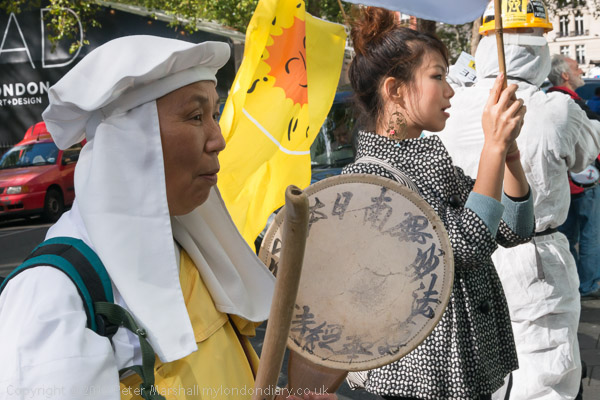 Japanese
activists outside the London offices of TEPCO, responsible for Fukushima
Japanese
activists outside the London offices of TEPCO, responsible for Fukushima
more pictures
Every Friday in Japan, many thousands protest against reopening nuclear power stations and plans for new nuclear plants at the Prime Minister's house and in cities across Japan. Protests in solidarity take place in London at the embassy and TEPCO.
After the Fukushima disaster all 54 Japanese nuclear reactors were shut down for "safety checks", and powerful public opiniion was opposed to any reopening. At first it seemed as if the Japanese government might call a halt to nuclear power, but more recently they have changed their policies. First they called for the phasing out of nuclear power in Japan by 2030, then extended that to 2040
More than 80% of Japanese are against nuclear power and distrust the information from the government about radiation dangers. In October 2011 the Japanese cabinet called for a reduction in Japan's reliance on nuclear for electricity generation and in May 2012 the last remaining plant was shut down.
But on 1 July one of the reactors at the Oi nuclear plant was restarted, and later another joined it, despite popular protests and requests for closure from the city and prefecture of Osaka, who stated that the power was not needed.
The disaster at the Fukushima Dai-ichi plant caused by the March 2011 tsunami has increased fears around the world about the safety of nuclear power plants. The plant was run by the Tokyo Electric Power Co (TEPCO) who have finally released a statement admitting that it had known safety improvements were needed before last year's tsunami triggered three meltdowns, but it had not implemented them because of fears about the political, economic and legal consequences. The statement is a major reverse for TEPCO who had previously argued that it had made suitable preparations to deal with tsunamis and to manage crises such as the meltdown.
Protests have been taking place at the Japanese embassy for several months every Friday in solidarity with the protests in Japan. The protesters are also declaring their opposition to UK government plans to extend the live of our currently operating stations and to build new ones. Among their slogans they say "End Nuclear Power in the UK! No Fukushimas here!"
The protesters also emphasize the problems of nuclear waste, to which no adequate solution has been found. Nuclear waste links the UK to Japan, with some of that country's nuclear waste being reprocessed at Windscale in Cumbria to produce nuclear fuel. There are also links between the Japanese nuclear industry and the USA, and the reopening of nuclear power plants and the proposed new plants are alleged to be in part a response by the Japanese government to US pressure.
The protests are organised by the group Kick Nuclear, and after some hours of protest outside the Japanese embassy on Piccadilly, the protesters moved off towards the London offices of TEPCO. Many of the 20 or so protesters today were Japanese and the protest was conducted with typically Japanese courtesy, with protesters bowing towards the security personell on the embassy steps before they left - and the gestures were returned.
The protest in Picadilly attracted the attention of a number of tourists in the area, including quite a few Japanese, as well as others going in and out of the embassy and the leaflets the protesters gave out were bilingual English/Japanese.
A similar courtesy obtained at the offices of TEPCO in an office development
in Berkeley Square where the protest continued for another half hour.
more pictures
G4S Killed Jimmy Mubenga
Rose Court, Southwark and G4S, Victoria St. Fri 12 Oct 2012
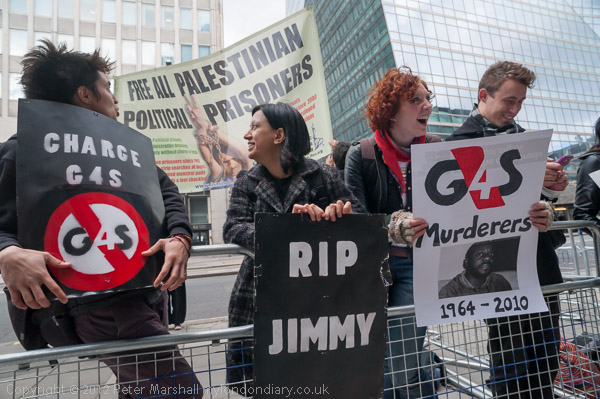
Outside the G4S Headquarters in Victoria St, Westminster.
more pictures
On the second anniversary of the death of Jimmy Mubenga when G4S guards restrained him on a BA flight during his focible deportation to Angola, protests outside the CPS and G4S offices calling for G4S and their guards to be prosecuted for murder.
Although eye-witnesses on the flight out of Heathrow confirmed that the three G4S guards had used excessive force and that Mubenga called out "I can't breathe" and "they're going to kill me" before he collapsed, the Crown Prosecution Service inexplicably decided last year that neither G4S nor the three guards will face manslaughter charges due to "conflicting witness accounts." The only conflict appears to have been between the accounts of the other passengers on the flight and the initial accounts put out by the Home Office and G4S, later shown to be untrue - and doubtless the accounts of the killers.
Former chief inspector of prisons Lord Ramsbotham condemned the decision as 'perverse'. G4S management was warned in 2006 over using the kind of dangerous restraint techniques which caused Mubenga's death, which was not the first case in which someone has died because of the use of force by G4S guards. After his death, four G4S employees secretly informned the Home Affairs Select Committee investigating the case of how the guards had developed a technique for restraining deportees in aircraft seats by forcing their heads between their leads - something known in the company as "carpet karaoke", a procedure that is strictly prohibited because it can cause suffocation, skull fractures and blindness. The parliamentary committee concluded there was evidence of "innappropriate use of physical restraint, and the possible use of unauthorised and potentially dangerous restraint techniques."
The inquest into his death has still to be heard - the kind of long delay the authorities use to evade justice in such cases of death at the hands of the people killed by the police or other organisations acting on behalf of the government. Had this been a case involving the death of a police officer or security acting for the UK Borders agency, there is no question that the case would have been brought to court, and with a minimum of delay.
Around 15 people, including members of Jimmy Mubenga's family, came to the protest outside the CPS at Rose Court on Southwark Bridge Rd this morning, where they held placards and handed out leaflets. The family then went on to visit Jimmy Mubenga's grave, while another protest took place outside the G4S UK & Ireland head office on Victoria St in Westminster. The protests were organised by the 'Stop the G4S coalition, No Borders London and the Stop Deportation Network.
People were still arriving for this when I left a little after 3pm and by then around 30 people were holding banners and placards or handing out leaflets on the busy street. At times they chanted about the death, calling G4S murderers, and there were many who stopped to take leaflets and talk about the details of the case.
As well as those protesting against the death of Mubenga, there were also
people arriving to protest against G4S for their involvement of the infamous
Al Jalame interrogation centre in Israel, where the placards from the Islamic
Human Rights Commission make claims of "children locked in small
filthy cells - Solitary for 65 days - Hands & feet shackled, tortured
for hours."
more pictures
In Protest Opening
Shoreditch Gallery, The Juggler, Hoxton Market. Tue 9 Oct 2012
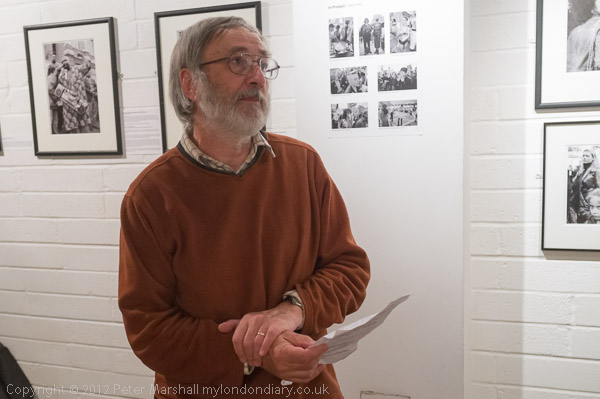
I spoke briefly at the opening - photograph by Paul
Baldesare
more pictures by Paul
My show 'In Protest' had actually opened over a week before the opening event. The arrangements were only made while we were actually hanging the show, and we needed to give people a little advance notice.
You can read the text of my speech on >Re:PHOTO,
where there is also more about the show which included black and white work
mainly from before I started 'My London Diary' as well as colour images, all
taken on digital, which are also featured on this site. But there were only
room for a rather smaller number than the 60,000 or so here! Thanks to Paul
Baldesare for taking all the pictures on my Fuji X100.
more pictures by Paul
Troops Out of Afghanistan
Trafalgar Square & Downing St. Sun 7 Oct 2012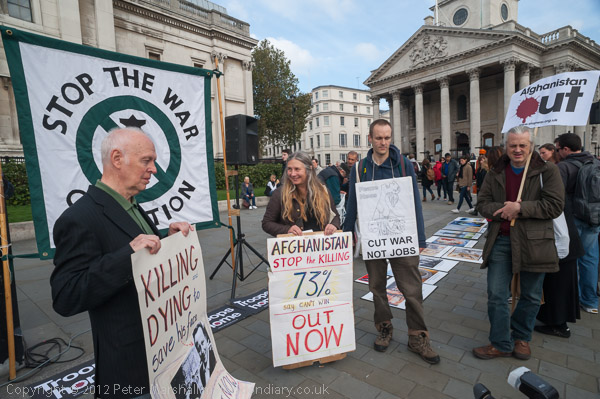
more pictures
Rehouse the Counihans
Kilburn, London. Sat 6 Oct 2012
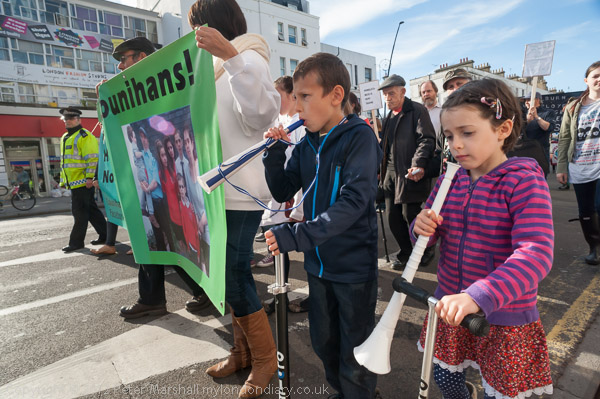
The march started off down Kilburn High Rd, going to the estate where the
Counihans used to live
more pictures
A march and rally demanded that Brent council rehouse the Couninhan family from South Kilburn, made homeless by the council because they inherited 9.5 acres of farmland in west Ireland earns them £18 a week.
When Anthony Counihan's father died a couple of years ago and he inherited the family plot in Peterswell, Galway, a few acres of poor land with a shack on it, it didn't seem likely it would change his life, and the rent from it at £18 a week was hardly a great contribution to the income of this family, well-respected in South Kilburn where Anthony, a London bus driver, had brought up his children.
But being an honest man, he reported it to Brent council. They responded with an eviction order and a demand for repayment of £70,000 of housing benefit. Since then council officisals have advised the family to 'move back to Ireland' - although only Anthony was born there and Isabel and the five children were born in Brent, and local MP Glenda Jackson suggested they move to Wales. The official whose advice was to move back to Galway also advised that Anthony should hang on to his job as a bus driver out of the Cricklewood depot as jobs were hard to find, suggesting he should commute from Galway!
Anthony and his family had moved from a council property in Kilburn to Galway to look after his sick father in 2007, signing away the lease on their council property after the council had failed to advise him they could sublet the tenancy for their year in Ireland. On returning to Brent, the council eventually found them a high-rent private property in Kilburn, but they were unable to afford the rent and were evicted. The council then found them temporary housing some miles away in Ealing, despite the children attending five different schools in Brent - and this was also at a rent the family were unable to afford - and again they were threatened by eviction.
Brent Council has decided that the Counihans have made themselves "intentionally homeless", which would enable them to refuse their statutory duty to rehouse them. Anthony has offered to sell the land, or even to give it to Brent Council after they threatened to sue for fraud as the land was 'capital' and thus he was not entitled to benefits.
The case has revealed an astonishing level of both incompetence and lack of humanity among both officers and councillors in Brent Council, and some have made highly misleading or factually incorrect comments in public. Some have seen this case as just one example of a policy by the Labour run council of 'social cleansing', the removal of working class families from the area as a part of their implementation of the Government's programme of cuts. They accuse the council of "behaving vindictively, dishonestly, and punitively towards local residents."
A little under a hundred local residents and groups gathered for a rally in Kilburn Square before marching around South Kilburn to a rally in the South Kilburn Estate, which was addressed by Isabel Counihan-Sanchez with one of her daughters and speakers representing various groups supporting the family, including trade unionists, local residents and representatives of various groups including the Kilburn Unemployed Workers Group.
The march stopped on its route outside a house on Cambridge Avenue, where
the basement flat had been the home of Nygel Firminger. He had various problems
over employment - including 3 months in work for which he did not get paid
- and had received a head injury at work for which he required medication,
but was still being pressured to find work and facing possible sanctions by
the Kilburn jobcentre. When he wasn't getting paid he had turned to loan companies
and was having to pay back these loans rather than pay his rent, and was evicted
from the flat by the housing association. On the day he was evicted he was
barred from returning to the flat to collect his medication. Later in the
day he got back into the flat and was later found dead there. Am inquest on
this death is to be held on Nov 1st.
more pictures
Muslims against Anti-Muslim Film
Old Palace Yard, Westminster, London. Sat 6 Oct 2012
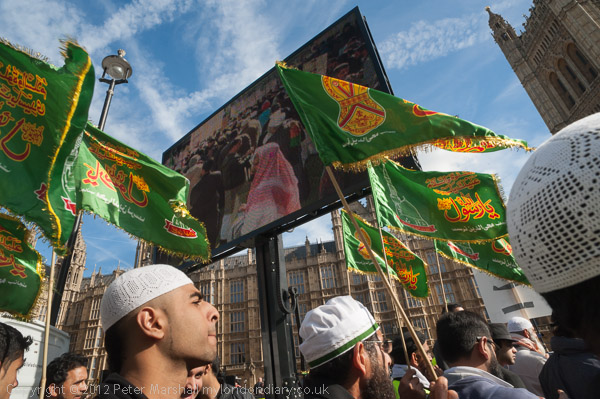
Muslims with flags and a giant screen opposite Parliament
more pictures
Thousands of Muslims packed Old Palace Yard opposite the Houses of Parliament in a peaceful protest against the Anti-Muslim film made in the USA. They called for laws to protect religious figures.
The protest made clear the strength of feeling among some British Muslims at the affrong to their religion by the film - a crudely made short video by Egyptian-born Mark Basseley Youssef (aka Nakoula Basseley Nakoula) which has prompted violent anti-American protests in various Muslim countries. Youssef is now in jail in Los Angeles befora a hearing for violating the terms of a probation order following a conviction for a bank fraud in 2010. He is alleged to have made the film using the alias Sam Bacile, and the order included a ban on his using any aliases without the permission of his probation officer.
I was at the protest for almost an hour, but only one of the speeches that I heard was in English. The placards however were, and their messages 'Stop Hurting Muslims', 'Freedom of Speech is Not Freedom to Abuse', 'The Prophet is Dearer to us than our lives', 'Stop Islamophobia' were clear, as was the strength of feeling shown in the responses to the speeches, with much raising of arms and shouting.
It was, as with many Muslim events, a segregated affair, with the women being
relegated to a small corner of the area behind the stage so they were unable
to see the speakers and had only a distant view of the giant screens. There
was not a single woman in the large group sitting on the stage, and at least
during the time I was there, no women speakers.
more pictures
Britain First - Muslim Grooming
Westminster, London. Sat 6 Oct 2012
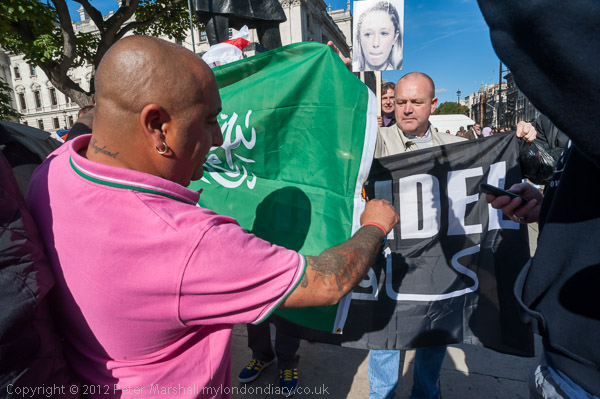 Protesters
tried to burn an Islamic flag, but it wouldn't burn properly
Protesters
tried to burn an Islamic flag, but it wouldn't burn properly
more pictures
Britain First held a protest at Downing St against the grooming and abuse of young girls by Muslim gangs, and the failure of police to properly investigate. Afterwards they marched to Parliament Square and burnt an Islamic flag.
Britain first describes itself as "a modern, responsible patriotic political movement that uses the latest methods in activist and digital campaigning to fight the many social and cultural injustices that are routinely inflicted on the British people who have, in effect, been left defenceless, voiceless and marginalised by our political leaders." It is one of what seem to be a growing number of small groups on the right of British politics which have been prompted by the failure of mainstream politics to connect with many in our society, and largely based on mainly white working class supporters who feel themselves to have been overlooked as Britain has moved towards being a multi-cultural community.
The protest against what they describe as 'Britain's secret shame - Muslim Grooming' was also advertised on the web by several sites of the English Defence League, and there were several people connected with that organisation present. It was a fairly small group - perhaps around 30 people - when I arrived opposite Downing St. Talking with some of the protesters were Christians from Pakistan, who are victimised by the Muslim regime in that country and were to hold their own protest opposite Downing St an hour or two later.
After protesting for around an hour opposite Downing St, the Britain First protest marched off down Whitehall and into Parliament St, where they were joined by more supporters who had been refreshing themselves in the pub. They crossed into Parliament Square and held a short rally under the statue of Winston Churchill, with a few short speeches about the failure of the authorities to seriously investigate the cases of grooming of young girls by Muslim gangs, with well-known cases that have emerged - and for which people have been convicted - in Rochdale, Derby, Rotherham, Sheffield and Birmingham, with cases ongoing in Burnley and Oxford. They allege that there have been "Countless young victims, lives lost, lives ruined whilst the politically correct police do nothing!" and that these cases are simply the "tip of the iceberg."
The protesters then attempted to burn an Islamic flag. Police made an attempt
to stop this, but there were only two officers on hand at the time and they
were unable to prevent it happening. However the flag itself proved to be
made of a material that would only burn slowly and with difficulty. As the
protesters left the site when Paul Golding of Britain First had thanked those
who had come and the protest seemed to have ended, a small group briefly surrounded
a vehicle with covered with Islamic slogans on its way to the large Islamic
protest nearby, before being moved away by police, more of whom had by now
arrived. A handful of protesters then crossed to the corner of Bridge St and
protested there for a few minutes before making their way up Whitehall where
I left them.
more pictures
Save Our Hospitals - Shepherds Bush
Shepherds Bush, London. Sat 6 Oct 2012
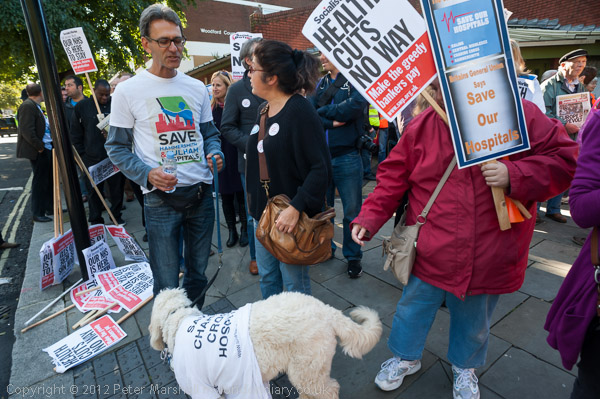
Protesters gathered at Shepherds Bush for a march to
Hammersmith and the Charing Cross Hospital
more pictures
The proposals to close Accident and Emergency services at four of the nine hospitals in North West London have provoked fury among local residents in Hammersmith and Fulham and the other boroughs affected. Hammersmith & Fulham Council and other local councils have also voiced their opposition.
Under the proposals, Charing Cross Hospital in Hammersmith would lose nine of the 11 major types of service currently provided on-site, including the A&E, becoming a 'local hospital', while Hammersmith Hospital would become only a specialist unit.
People gathered at Shepherds Bush for a march though Hammersmith and past Charing Cross Hospital on the Fulham Palace Road to a rally at Lillie Road recreation ground, which I was unable to attend. By the time the march left along Shepherds Bush Green there were perhaps almost a thousand people taking part, with more expected to join them for the rally in Hammersmith.
The plans would keep open A&E units at five major hospitals, Chelsea and Westminster, St Mary's Paddington, Northwick Park, West Middlesex and Hillingdon - all fairly slow journeys over congested roads from much of the area. The public consultation over them comes to an end in October and a decision is expected in early 2013.
Protests and marches opposing the plans took place a couple of weeks ago
in Harlesden, with a march to a rally at Central Middlesex Hospital, and there
were marches from Southall and Action to a rally in Ealing.
more pictures
Justice For Yarl's Wood Women
Home Office, London. Thu 4 Oct 2012
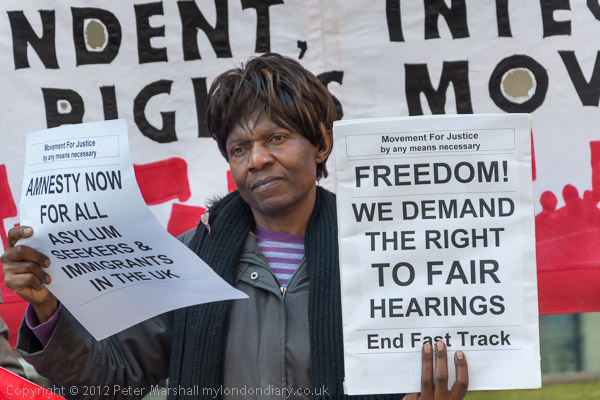
Asylum seekers and Immigrants are unfairly treated by
the UK Borders Agency with no concern for their safety
more pictures
A protest by Movement for Justice at the Home Office supported the demands for fair and just treatment made by women detainees in the Movement for Justice group inside Yarl's Wood detention centre.
Around 30 people, mainly women, had turned up to support the protest outside the Home Office by the time I had to leave, with several arriving as I went. The two main banners were from the Movement for Justice and its LGBT section, but there were also those of the All African Women's Group and Black Women's Rape Action Project.
There were some short addresses and loud chanting of slogans:
'Asylum seekers have the right -
Here to stay and here to fight'
with the first line having variations, with 'Refugees' or 'Women of Yarl's Wood' in place of Asylum seekers. Another chant went: 'Racist, sexist, anti-gay, you can't take our right away.'
Then we got news direct from one of the women in Yarl's Wood by mobile phone, although unfortunately the phone signal wasn't loud enough to relay her voice directly over the megaphone, and we had to rely on someone telling us what she was saying. Margaret told us that she had collapsed and fallen down the stairs in Yarl's Wood in February, injuring her back and that she was still not able to walk properly. Although here fall had been in February it was only two months later, in April, that she was allowed to go to hospital. Despite her injuries, she was still not being allowed out of Yarl's Wood. She felt that the health care services in the detention centre were conniving with the Home Office, saying that she was fit although she was clearly not.
An official came out of the Home Office and told the protesters that two people would be allowed to go inside and present the petition they had brought. They said they would do so later after they had read out the petition which had been drafted by the women's Movement for Justice in the detention centre.
The demanded the right to a fair hearing and for the facilities - including Internet access - to allow them to contact organisations that can help them and to hear about the current situation in their countries. They want an end to the 'Fast Track' procedures that are designed to deport people before they have the time to prepare their cases and so deny them justice.
They argue that people, many of whom are the victims of rape, abuse and torture, should not be "held against their will for simply seeking freedom and safety," and want an end to deportationsm particular the mass deportations on charter flights and removals on scheduled flights.
Many women who claim asyslum have been victims of human trafficking and violence and abuse within the family; some are fleeing from female genital mutilation or because they have opposed such practices. Others seek asylum because they face persecution - or even the death penalty becuase of their sexual orientation. Britain publicly opposes the persecution of lesbians, gay, transgender and intersex people, but the UKBA and the Fast Track system are complicit in sending people back "to the hands of our tormenters and oppressors."
Women held in detention centres are denied their freedom of speech, expression and organisation; their use of the Internet is denied or monitored and they are intimidated and threatened if they stand up for their rights or try to organise other women to express their views and demands. Their rights to privacy and respect are also abused, with male officers barging into female detainees' rooms and the UKBA (or its contractors) supervising their medical consultations.
Women are also exploited when they do cleaning or other work in the detention centres, being paid at the derisory rate of 50p an hour - they demand at least the minimum wage, and for the right to do paid work while their applications to the Home Office are outstanding. Detainees need money to buy credit for their phones or to buy items they need from the detention centre shops, including toiletries and food - and they want an end to the overcharging for goods in these. Detainees even have to pay for goods that are donated for free by charities and they complain they are charged £10 to access their medical records.
They also demand an amnesty now for all asylum seekers and immighrants currently in the UK, which would end cases such as that of Esther Sarah Nakuyejwe, a 43 year old diabetic whose health is deteriorating in detention and is under threat of deportation to Uganda. She came to the UK in 2001 as a student, but after she had been given misleading information by the Home Office, they took away her passport in 2005 and have not returned it. She worked in various NHS hospitals as a nursing assistant for 10 years and her entire family - a sister, four cousins and neices and nephews - is now in the UK except for a terminally ill mother still in Uganda.
The protest was continuing when I had to leave.
more pictures
NHS Lone Protest - Narinder Kapur
Dept of Health, Whitehall, London. Thu 4 Oct 2012
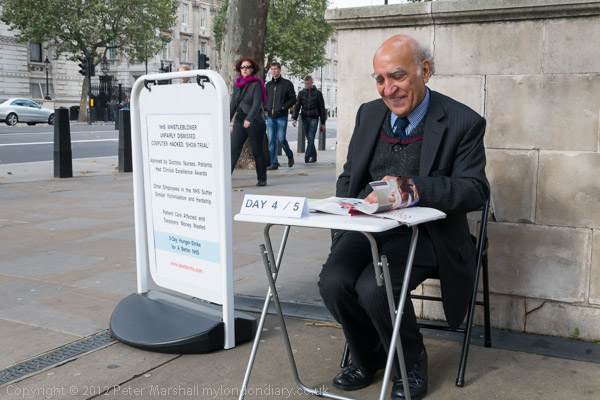
Dr Narinder Kapur, sacked for reporting incidents that
endangered NHS patients on 5 day hunger strike
more pictures
Pioneering neuropsychologist Dr Narinder Kapur, past-President of the British Neuropsychological Society and a fellow of the British Psychological Society was sacked from his post as Head of Neuropsychology at Addenbrooke’s Hospital for complaining about the use of unqualified staff in neurosciences clinics and about staff shortages which he felt were endangering patient care. A tribunal in July 2012 found he had been unfairly dismissed and criticised the Cambridge University Hospitals NHS Foundation Trust on 18 points. The trust has so far taken no action on any of these points and has not censured the staff responsible for the failures in any way.
Dr Kapur staged a 5 day hunger strike in front of the Dept of Health in Whitehall
to draw attention not just to his own case but to the management failures
in the NHS which led to it and to other similar cases of dismissal of dedicated,
respected and talented consultants, including two other Indian doctors at
Addenbrooke’s. He is now a visiting Professor of Neuropsychology at
University College London.
more pictures
Shut Down Guantánamo, Halt Extraditions
US Embassy, London. Thu 4 Oct 2012
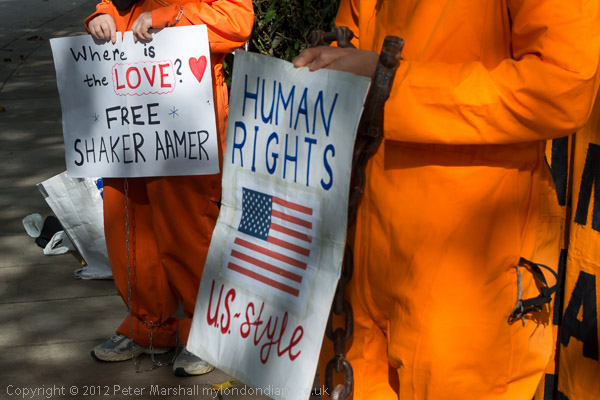
Londoner Shaker Aamer is still held in Guantanamo and
we are deporting others who face life in solitary
more pictures
Today's monthly protest at the US Embassy and at Marble Arch by the London Guantánamo campaign called for the release of London resident Shaker Aamer from Guantánamo and for an end to the extradition proceedings against Babar Ahmad and Syed Talha Ahsan.
Today's protest took place as the High Court proceedings involving Babar Ahmad and Syed Talha Ahsan were continuing at the High Court, where final legal arguments against their extradition were being heard, along with those of radical cleric Abu Hamza and two men accused of being key aides of Osama bin Laden in London.
Babar Ahmad and Talha Ahsan are alleged to have been connected to an extremist web site. Both were living in Tooting and so their crimes - if any - were committed in the UK, but the CPS decided they could not be prosecuted in this country and the DPP has refused leave to bring a private prosecution against them in this country. Both have been held without trial in UK prisons, Ahmad since 2004 and Ahsan since 2006, because of extradition requests by the US government.
Although a UK judge found that the alleged crimes took place on UK run web sites, the US claims the right to try the two men as it says the sites were hosted by a company based in Connecticut.
If convicted in the US, the two men face being locked up for life in solitary confinement in the special ADX Florence "supermax" prison in the US, under conditions that many consider amount to torture, and inhuman and degrading treatment.
Shaker Aamer, who lived in this country for some years after being granted the right to reside, has a wife and children in Battersea, but has been in Guantánamo since 14 February 2002, when he was brought there after being tortured in Afghanistan, where he had been kidnapped and sold to the US authorites by local bandits. There is no evidence against him that would stand up in any court and he has never been charged or tried, and was cleared for release under the Bush administration in 2007, and the Obama administration in 2009. But he was tortured in Guantánamo and also stood up for the rights of other prisoners there, and if released it is considered that his evidence about his treatment and that of others would be extremly embarassing for both US and UK governments.
As we look forward to the 600th anniversary of the signing of the Magna Carta in a couple of years, something regarded as a legal landmark both here and in the USA, these cases show that many of our hard-won freedoms are no longer operative, either here or in America.
The London Guantánamo campaign holds large and high-profile demonstrations on occasions such as the anniversary of the setting up of the camp, but also keeps up a presence at the US embassy throughout the year with smaller monthly protests such as today's, when half a dozen people, three of them wearing orange jumpsuits and a couple of those with chains and black hoods brought leaflets, a megaphone and a poster display to the front of the US embassy for a noisy and visual hour of protest.
After an hour they then moved to the much busier street corner at Marble
Arch, just outside of 'Speakers Corner' - where apparently political protests
are not allowed. There they attracted considerable attention with many of
those passing stopping to take photographs or talk with the protesters, and
some posing for photographs with them.
more pictures
Support for March for Justice 2012
Tavistock Square, London. Mon 1 Oct 2012
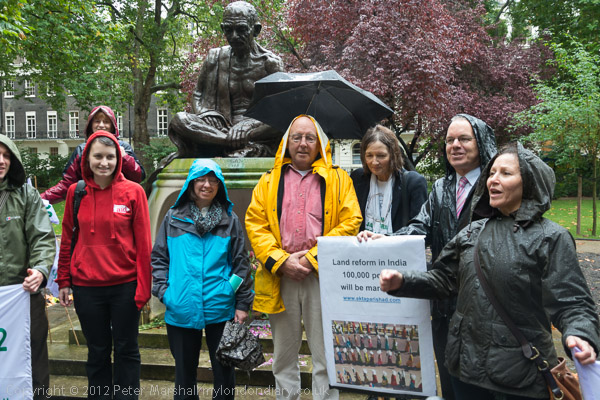
It was raining hard as those present shouted their support
for Ekta Parishad in front of the Gandhi memorial
more pictures
Supporters of the land rights movement Ekta Parishad in India met at the Gandhi memorial in London in a show of support for Jan Satyagraha - March for Justice 2012 from Gwalior to Delhi which starts on Gandhi's birthday, 2 October.
The just over a dozen people who met at the memorial in Tavistock Square came from a number of charities which work with groups in India, including Christian Aid, War on Want, Action Village India and others. Because of the heavy rain the speeches and discussion which had been scheduled for the square were abandoned and the discussion continued in nearby Friends Meeting House.
The march in India, organised by Gandhi-inspired grassroots land-rights movement Ekta Parishad, and attracting support from over 200 Indian organisations will have 100,000 marchers who will take 30 days to cover the almost 220 mile from Gwalior in Madhya Pradesh to Delhi, eating just one meal a day. They are determined to make their voice heard by the Indian government, and both the government and the opposition BJP are now taking an interest in land issues.
According to recent studies, almost half of Indian children are malnourished. Economic development has not benefited they poor, but has allowed large firms to establish legal claims to land on which many of them have lived for generations. The displaced people lose any chance of growning their own food, and have to move to the towns where they try to scrape a living, often with little success.
The march by Ekta is being supported by groups throughout Europe, including Action Village India (AVI) who organised today's event and other UK charities. Last Saturday the Swiss section of the International Human Rights Society dedicated the 2012 Human Rights Award to P V Rajagopal, Vice Chair of the Gandhi Peace Foundation and president and founding member of Ekta Parishad, "in recognition of his dedicated engagement and the non-violent action in favour of the most disadvantaged people in India."
AVI delivered a letter in support of the land rights movement to the Indian High Commission in Aldwych for Indian Prime Minister Manmohan Singh before coming the event at the statue of Mahatama Gandhi, who was born Oct 2, 1869 and assassinated in 1948 shortly after independence.
In a phone link with the march organisers in Gwalior we heard of the plans being made for the march with many thousands already having arrived at the Mela Ground for its start tomorrow, and also of talks with several Indian government ministers who were telling Ekta that there was no need for the march as the government was committed to taking action. The Indian Minister for Rural Development, Mr Jairam Ramesh, has promised to come and talk to the marchers in Gwalior tomorrow and give some specific answers to the people's claims. The marchers can now celebrate these official promises and the march will provide the government with the support they will need to carry reforms through as well as the pressure to ensure that this time they will keep their promises.
Five years ago, in 2007, Ekta organised a narch of 25,000 people to Delhi, and Rajagopal met the minister for rural development and government officials who set up a Committee on Land Reform and a Council chaired by the Prime Minister to take things forward. But although this led to a Forest Rights Act which gave more rights to the adivasis, India’s traditional forest-dwelling communities, little has been done to implement this and the promises have not been delivered.
Action Village India is a charity started by people who had lived or worked
in India which supports six locally-based partner organisations in which work
with marginalised and disadvantaged rural people in the Gandhian tradition
of non-violent change. It isn't a rich charity, but a hard-working one, and
one source of their income is the Madras cafe run by AVI volunteers at WOMAD
and some other events. Ekta have been one of the organisations they have supported
since 2001.
more pictures
All pictures on this section of the site are Copyright © Peter Marshall 2012; to buy prints or for permission to reproduce pictures or to comment on this site, or for any other questions, contact me.

